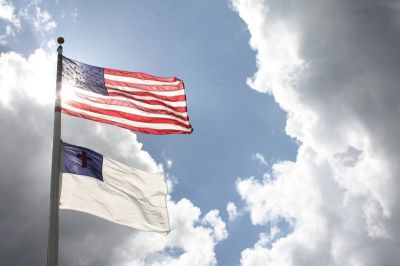Is Christian nationalism a threat to democracy?

Have you noticed that, almost everywhere you turn, “Christian nationalism” is in the news? On March 3, a headline on The Christian Post stated: “John MacArthur denounces Christian nationalism as ‘faulty viewpoint’ linked to postmillennialism.” On March 7, USA Today announced: “As Trump support merges with Christian nationalism, experts warn of extremist risks.” Similar headlines could be multiplied by the hundreds. But what, exactly, is Christian nationalism? And is it truly a threat to democracy?
Already in November 2022 an article posted on The Conversation noted that “Talk of ‘Christian nationalism’ is getting a lot louder — but what does the term really mean?” That remains a valid question: What does the term really mean? Or does it mean different things to different people?
Are you a Christian nationalist if you love Jesus and love your country? Are you a Christian nationalist if you are simply a patriotic Christian? Are you a Christian nationalist if you believe that America was founded on Christian principles and that, the more we adhere to those principles the more our nation will be blessed? And were the Founding Fathers Christian nationalists?
Or are you a Christian nationalist if you believe that our nation should be ruled by Christian law? Or that the only ones who have the right to govern America are Christians? Or that the current government should be overthrown because it is anti-Christian?
In their book Christian Nationalism: A Biblical Guide To Taking Dominion And Discipling Nations, Andrew Torba (the CEO of Gab) and Andrew Isker write that, “Christian Nationalism is loving your neighbor. Who is our neighbor? Our fellow citizens and especially our brothers and sisters in Christ. Loving them means protecting them from foreign interests, alien worldviews, and hostile invaders. Christian Nationalism means placing the interests of your neighbor and your home above the interests of foreigners in foreign nations. This doesn’t mean we neglect foreign nations or do not extend love to them, but rather that we place the interests and worldview of our home above foreign ones.”
They continue, “While we recognize that Christ’s Kingdom is not of this world, we also realize the fact remains that He has all authority on earth as well and has commanded us to disciple all nations.” (In a separate article, I’ll interact with Pastor MacArthur’s comments which emphasize the heavenly and spiritual nature of Christ’s Kingdom and which deny the very concept of “Christian nationalism.”)
At the same time, they make clear that, “If we are going to build a Christian movement it must be exclusively Christian and we can’t be afraid to say that out loud.” That means no Jews or people of other faiths at the nation’s helm, along with no atheists or “fake Christians-in-name-only.”
Is that what it means to be a Christian nationalist?
Two years ago, recognizing that Christian nationalism was going to be a very hot topic (along with the ubiquitous “NAR,” meaning the “New Apostolic Reformation”), I joined together with Dr. Joseph Mattera, a theologian and an international leader of leaders, to draw up the “NAR and Christian Nationalism Statement.” We recognized some dangerous trends in some Christian nationalist circles, the worst of which raised their heads on January 6, 2021. But we also recognized that fine, God-fearing, America-loving, followers of Jesus would be tarred and feathered as Christian nationalists.
If you have the time, I would encourage you to read the entire statement, which is about 1,500 words long. For the moment, rather than giving my own definition of Christian nationalism, which I really can’t do, since it means different things to different people, let me cite the final two sections of our statement.
After noting “that for some, this simply refers to a healthy form of Christian patriotism, of loving God and loving one’s country, we added:
BUT WE SEE IT AS SPIRITUALLY DANGEROUS IF/WHEN…
- We wrap the Gospel in the American flag (or any national or state flag).
- We equate our country with the Kingdom of God.
- We confuse patriotism with spirituality.
- We compromise our ethics to keep our party (or leader) in power.
- Our church/denomination/ministry becomes an appendage of a political party.
- We put more trust in earthly methods than in spiritual methods.
- We marry the cause of Christ to the cause of a political party (or leader) as if they were one and the same.
- We become as vulgar and rude as the candidates we follow.
- We look to the White House or any branch of government in any nation more than to God.
- We make a human being into a political savior.
- We equate loyalty to God (which should be unconditional) with loyalty to a party or political leader (which should be conditional).
- Our prayers and our prophecies become politically partisan.
FINALLY, WE CONCLUDE BY CONTRASTING THE KINGDOM OF GOD WITH EXTREME NATIONALISM:
- The Kingdom of God prioritizes the advancement of the Gospel. Extreme nationalism prioritizes the advancement of its ideology even at the expense of the Gospel.
- The Kingdom of God produces loyalty to Christ above all else. Extreme nationalism produces loyalty to one’s nation above all else.
- The Kingdom of God raises the banner of Jesus above all else. Extreme nationalism raises the national flag above all else.
- The Kingdom of God promotes the interests of God above the world. Extreme nationalism promotes the interests of one’s nation above the Kingdom.
- The Kingdom of God views the world through a biblical lens. Extreme nationalism views the world solely through a geopolitical lens.
- The Kingdom of God is dependent upon neither an earthly kingdom nor an earthly ruler but upon Jesus as the King of kings (Revelation 19:16). Extreme nationalism is dependent upon both the ideology of an earthly nation and its ruler.
- Followers of the Kingdom of God are passionate about a Christ-centered global awakening. Adherents of extreme nationalism are focused primarily on a political/ideological awakening.
- Christ-followers are primarily identified with the Kingdom of God. Extreme nationalists derive their primary identity from their nation.
- Christ-followers derive their primary value from being children of their heavenly Father (Romans 8:14-17). Extreme nationalists derive their primary value from being citizens of their country.
My suggestion is that, rather than debate the meaning of Christian nationalism we lay out what we do and do not believe, affirming what is right and rejecting what is wrong. Then, to the extent our convictions are biblically based, we seek to live out those principles for the good of the nation, without coercion, force, or God forbid, violence.
Let’s honor Jesus in our own lives while we work for the betterment of the nation as a whole.
Dr. Michael Brown (https://thelineoffire.org/) is the host of the nationally syndicated The Line of Fire radio show. He is the author of over 40 books, including Can You be Gay and Christian; Our Hands are Stained with Blood; and Seizing the Moment: How to Fuel the Fires of Revival. Dr. Brown is dedicated to equipping you with hope, engaging your faith, and empowering you to become a voice for Moral Sanity and Spiritual Clarity. You can connect with him on Facebook, X, or YouTube.




























